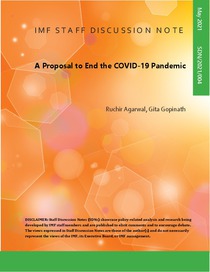A proposal to end the Covid-19 pandemic

Agarwal, Ruchir ; Gopinath, Gita
IMF - Washington, DC
2021
53 p.
epidemic disease ; economic recession ; economic recovery
IMF Staff Discussion Note
SDN/2021/004
Business economics
English
Bibliogr.
9781513577609
"Urgent steps are needed to arrest the rising human toll and economic strain from the COVID-19 pandemic that are exacerbating already-diverging recoveries. Pandemic policy is also economic policy as there is no durable end to the economic crisis without an end to the health crisis. Building on existing initiatives, this paper proposes pragmatic actions at the national and multilateral level to expeditiously defeat the pandemic. The proposal targets: (1) vaccinating at least 40 percent of the population in all countries by the end of 2021 and at least 60 percent by the first half of 2022, (2) tracking and insuring against downside risks, and (3) ensuring widespread testing and tracing, maintaining adequate stocks of therapeutics, and enforcing public health measures in places where vaccine coverage is low. The benefits of such measures at about $9 trillion far outweigh the costs which are estimated to be around $50 billion—of which $35 billion should be paid by grants from donors and the residual by national governments potentially with the support of concessional financing from bilateral and multilateral agencies. The grant funding gap identified by the Access to COVID-19 Tools (ACT) Accelerator amounts to about $22 billion, which the G20 recognizes as important to address. This leaves an estimated $13 billion in additional grant contributions needed to finance our proposal. Importantly, the strategy requires global cooperation to secure upfront financing, upfront vaccine donations, and at-risk investment to insure against downside risks for the world."
Digital
The ETUI is co-funded by the European Union. Views and opinions expressed are however those of the author(s) only and do not necessarily reflect those of the European Union or the ETUI.